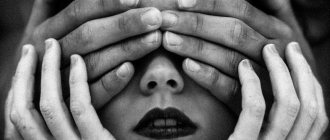Individual – personality – individuality
It is necessary to distinguish three concepts that relate to a person: individual, personality and individuality:
- An individual is a biological being from the human race.
- A personality is a social person who has certain social skills, performs certain social work, and occupies a specific social role.
- Individuality is the uniqueness of the image of a particular person who, with his qualities and skills, knowledge and manners, differs from other people.
An individual and a personality are not the same thing. A person is born an individual, but he is not yet a person, because he does not have social skills, knowledge, and does not even show any character traits.
However, personality and individuality interact with each other, although they are not combined into a single concept. Individual character traits form personality. At the same time, the individual is an exclusively social being. To be a person, you must have some social skills and take a social position. At the same time, individual character traits can be formed regardless of whether a person is in society or exists on his own.
All three concepts are undoubtedly intertwined:
- A person is born an individual who has all the capabilities and predispositions that will contribute to the formation of his individual qualities and social skills.
- Through education and inclusion in social life, a person becomes an individual.
- Through education, self-education, training, exposure to various situations, experiments and other factors, various qualities of character and behavior are formed, which make a person an individual, unlike other people.
go to top
The concept of the individual
The concept of individual can be used in two cases:
- When a person is classified as a certain type of living being. All humans are born as individuals because genetically and biologically they have all the characteristics that make them human. Anyone who has this set of biological characteristics is an individual.
- When a person is assigned to a certain group, but they are made into a separate entity. A group consists of separate individuals. Each individual constitutes a group if it includes several people. However, the group does not make the individual an empty place; he continues to remain an individual who influences the formation and development of the group or can leave it altogether.
Thus, an individual is a biological being of the human race who has a certain biological and social set of qualities. He is active, biologically programmed and social.
In another way, the concept of “individual” can be defined as “individual person”. Absolutely any person is an individual, despite the fact that he has his own set of genetic qualities and personal characteristics. Despite differences in appearance, behavior and character, absolutely any person who has common characteristic qualities is an individual from birth until death.
In psychology, the term individual is often used, which can mean not only an individual person, but also a certain set of his qualities, a separate unit of a specific group.
go to top
Int-groups and ext-groups
If the activities of a social group are aimed at its members, such as in sports clubs, then such a group is called an int-group.
If the activities of a social group are aimed at society, then this group is called an ext-group. A good example of such a group are various volunteer associations.
Progress for humanity means not only the development of technology and technology, but also the absence of wars and interethnic conflicts. Understanding what the main characteristics of a social group are, you can understand the processes occurring in society and influence them. Then the world will be a better place.
IntroductionWith all the importance of a person’s “natural qualities” and the need to take them into account in the process of social development, one should not forget that the essence of personality is social. Marx wrote: “...the essence of a “special personality” is not her beard, not her blood, not her abstract physical nature, but her social quality.” How is a person’s “social quality,” his social characteristics, formed? A person is not born a person, he becomes one by assimilating social experience. The nature of the development of the human individual into personality depends on society. The condition for the formation and development of a personality is its real social activity, the performance by a person of certain functions in society. All people are similar to each other in some way. And this allows us to talk about a person in general, talk about his traits, behavioral characteristics, etc. However, no specific person is an impersonal “person in general.” Everyone carries something within themselves that makes them unique, exceptional, i.e. a person with individuality. It is precisely such a person who enters the organization, it is precisely such a person who performs a certain job and plays a certain role in the organization, it is precisely such a person who needs to be managed, helping him to reveal and use his potential in solving the problems of the organization, creating the necessary conditions for his successful work and interaction with the organizational environment and solving your own life problems. Analyzing the process of personality formation, it is important to distinguish between the following aspects: - the process of personality formation, its achievement of social maturity; — the entry of a person into a certain social environment and the further process of its existence and development in a certain society. In the first case, we are talking about the development of the child in the process of social education and upbringing, during which he assimilates human forms of activity and relationships, standards and values of social consciousness necessary for him to achieve social maturity and become capable of performing certain social functions . The second refers to the social conditions of existence, activity and development of an adult. The purpose of this work is to study the social characteristics of an individual; to achieve this, it is first necessary to answer the question: “What types of activities or social functions are most significant for the formation of a person’s social qualities?” It is no secret that, while performing social functions, a person is formed by different facets of his personality: as a worker, as an owner-organizer and performer, as a citizen, as a family man, consumer, educator and educated, as a subject of knowledge, communication, leisure, etc. . At the same time, it must be borne in mind that the activity of an individual in society is not generally a complex of all types of social practice, but those types of activities in which a person takes a more or less active personal part.
The essence of social behavior
Social behavior is one of the objects of study of sociological science.
Research in this area began to be carried out in the mid-19th century, and, in addition to the concept of “social behavior,” elements such as social action and interaction were included in the same category. Definition 1
Social behavior of a group - in sociological science, this is a qualitative characteristic of social action and social interaction, which are inextricably linked with each other.
Social behavior characterizes the behavior of an individual or social groups in certain conditions, in a particular social situation and environment. Social behavior may be uncharacteristic in different situations. For example, a certain number of deputies take part in the work of the State Duma, that is, they are actively involved in political activities. But their behavior is ambiguous, since some are interested in their activities, while others ignore their activities and responsibilities, staying at work only “for show,” because this is necessary to obtain benefits.
Finished works on a similar topic
- Course work Elements and signs of social behavior 440 rub.
- Abstract Elements and signs of social behavior 220 rub.
- Test work Elements and signs of social behavior 220 rub.
Receive completed work or specialist advice on your educational project Find out the cost
The behavior of participants in mass events can also be characterized in different ways. For example, some participants demonstratively peacefully follow the column, while others seek to show their deviant behavior, break the rules in order to demonstrate a negative attitude towards the current regime and a desire for change. All of these actions also fall under the category of “social behavior.” In other words, all people are equally participants in a socio-political event, but each participant behaves differently, depending on their interests, needs and worldview.
Thus, social behavior acts as a special way for the subject of a socio-political event (actor) to demonstrate his motives, preferences and attitudes, which are aimed at the implementation of social action and interaction.
Who is the individual?
An individual is an individual from the genus Homo sapiens, which can be classified as human. It has a certain set of genetic and biological characteristics. As it develops, it acquires social, personal and individual qualities.
Individuals are absolutely all people who are born from a female person. Just because people have different characters and views on the world does not make them animals or reptiles. Here you just need to have a certain genetic set that makes the creature human in appearance and functionality of its body.
All people are born individuals. However, as individuals grow, they become individuals. This is already due to the conditions in which a person develops and acquires his individual qualities and traits. Personality does not negate the fact that a person remains an individual.
go to top
Disadaptation in children
Today there is a critical situation that has developed in society associated with the social maladjustment of children. Increasingly, manifestations such as:
- reluctance to learn,
- pedagogical neglect,
- increased fatigue,
- severe exhaustion
- lack of focus,
- problems with concentration,
- alcoholism at an early age.
The reasons for the appearance of problems in childhood include:
- inadequacy of self-evaluation at the moment of communication,
- lack of communication skills, even basic ones,
- excessive demands on one’s environment, especially when the child is superior to his peers in certain parameters,
- emotional instability,
- anxiety and fear of communication,
- isolation,
- predominance of one's own self, a feeling of superiority over others.
When a child lacks communication skills, it is a significant barrier to interpersonal relationships.
Disadaptation in the social sphere can manifest itself:
- excessive aggression of the child,
- low self-esteem,
- lack of desire to communicate,
- imbalance, which may manifest itself as mood swings,
- isolation,
- showing your emotions in public.
This condition is very dangerous for children, as it can lead to serious consequences, namely:
- personal deformations,
- delayed mental and physical development,
- brain dysfunction,
- loneliness,
- disorders of the nervous system, in particular aggressiveness, suppression of the instinct of self-preservation, problems in relationships with other people and peers, and suicide.









